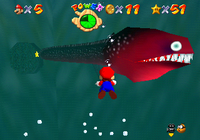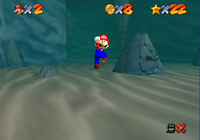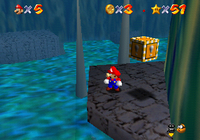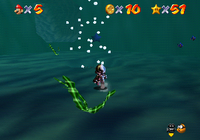Jolly Roger Bay
Template:Galaxybox Jolly Roger Bay is the third course in Super Mario 64 – and its remake, Super Mario 64 DS – that is filled with water and surrounded by cliffs. Above the water are two Metal Cap blocks, a cannon and a ! Switch to make a bridge to the ship (once it rises out of the water). Under the water is the ship in the first level, Unagi when that level is completed, a third Metal Cap, and the tunnel to the pirates cave.
The entrance to Jolly Roger Bay is on the main floor of Peach's castle, up the stairs to the right, and behind the star door labeled "3", meaning that three Power Stars are required to enter.
Levels
The level titles and numbers correspond to Super Mario 64 unless otherwise noted.
Star 1: Plunder in the Sunken Ship
Mario will need to dive down to the bottom of the bay and enter the ship's hatch. Blocking the hatch is Unagi, which will leave if Mario swims to the surface for air or touches the eel. Once it is dislodged Mario can swim inside. At the back of the ship is four chests which will need to be opened in the right order. If done correctly the ship will rise and drain out the water. The star is at the ship's bow in a yellow ! block, and Mario has to reach it by jumping over slippery platforms.
This level is basically the same in both Super Mario 64 and its remake, however there is only one chest in Super Mario 64 DS.
Star 2: Can the Eel Come Out to Play?
This level is the same in both Super Mario 64 and its remake. In order to get this star, Mario has to get Star 1 first. If he has, Unagi is now inside a small cave and will bite at Mario if he comes to close. When it lunges out, Unagi will swim away, and show a star at the end of its exposed tail. Mario has to carefully grab the star, if he touches the eel he will be shocked.
Star 3: Treasure in the Ocean Cave
This level is the same in both Super Mario 64 and its remake, Super Mario 64 DS. The third Power Star is inside the pirate's grotto which can only be reached by diving through the water. The grotto itself features large pillars that can fall into Mario's direction, as well as a Metal Cap. In order to get the star of it, Mario has to open the four treasure chests in it in the correct order, as previously with the chests in the sunken ship.
Star 4: Red Coins on the Ship Afloat
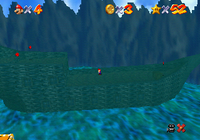
This star can only be obtained after rising the ship by getting the first star. Four of the Red Coins are inside clams under water. Three others are on the risen ship, which Mario can reach with special platforms which temporarily appear through a ! switch on the ground. The final red coin is on top of a stone spire which Mario can climb from a platform nearby. The Power Star itself appears on the ship when Mario has collected all Red Coins.
In Super Mario 64 DS, this level is the same, however it has been swapped with "Blast to the Stone Pillar", so that it is Star 5, not Star 4.
Star 5: Blast to the Stone Pillar
The fifth Power Star is on a ledge on the other side of the bay from Mario's starting position. Next to it is a stone pillar Mario can climb. In order to get to it, he first has to find the Bob-omb Buddy on a different platform and use the cannon to hit the pillar and reach the ledge. The star is inside the yellow ! box on the ledge.
In Super Mario 64 DS and the "Sindou Edition", this level is the same except for the fact that the star isn't in the yellow ! box. Also, Stars 4 and 5 are swapped in the remake, so this level is actually entitled "Star 4: Blast to the Stone Pillar ", and comes before "Star 5: Red Coins on the Ship Afloat".
Star 6: Through the Jet Stream
In Super Mario 64, Mario needs to become Metal Mario to get the star inside at the bottom of the bay. Using the first Metal Block and the cannon wastes time, so instead, Mario should use the Metal Cap near the ship and Long Jump in the middle of the bay. Another method is to use the cap in the cave.
In Super Mario 64 DS, the star is the only obtainable if the player uses Wario, because Wario is the only character that has able to use the metal ability.
Star 7 (DS): Switch Star of the Bay
Super Mario 64 DS added an extra mission to Jolly Roger Bay. In it, Luigi must step on the Star Switch in the Pirate's Grotto, making a Power Star appear behind the cage on the other side. He will then need the grab a Power Flower in the process, which will turn him invisible, so that he can go to the cage and grab the star.
Trivia
- The painting that acts as an entrance to Jolly Roger Bay depicts a sunken ship. However, in Japanese copies of Super Mario 64 (except for the Shindou Edition), the painting is of a cloud of bubbles. In Super Mario 64 DS, the painting is of bubbles regardless of the game region and the frame is turquoise instead of goldenrod.
- When Mario enters Jolly Roger Bay for the first time, the sky is dark and a layer of fog blankets everything. After getting the first star, the sky lights up and the fog vanishes. Unlike almost everything else in the game, even if the player replays the first star, these two effects won't return.
- Along with Dire Dire Docks, one of this stage's most unique features is that layers of the music get added as Mario dives in the water and another is added as Mario enters the cave.
- In the first star of this stage, the ship is underwater. After Mario flushes the water inside the ship on the first star, the ship is not underwater anymore.
- Jolly Roger is the name given to the typical pirate flags. It is also the name of the infamous pirate ship of Captain Hook, the pirate from Peter Pan.
